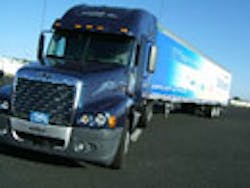Pushing safety technology tax credit
The Motor & Equipment Manufacturers Association (MEMA) and the Commercial Vehicle Safety Alliance (CVSA) are lobbying Congress hard to pass H.R. 3820, known as the "Commercial Motor Vehicle Advanced Safety Technology Tax Act," as a way to encourage fleets to install proven safety systems on their trucks.
"Our mission is to promote motor vehicle safety and security and save lives – and we believe passge of this bill will help us do that," said Stephen Campbell, CVSA's executive director, at a press briefing in Washington D.C. outlining the details of the proposed tax credit. "This will encourage fleets to invest in safety technology and help prevent or least substantially mitigate collisions between large trucks and cars."
At its core, H.R. 3820 provides tax credit worth 50% of the purchase price, up to $1,500 per system, with a maximum of $3,500 per vehicle and a maximum of $350,000 per fleet per taxable year. Technologies covered by the bill include collision warning, lane departure warning, blind spot warning, vehicle stability, and brake stroke monitoring.
CVSA in particular believes such tax credits will encourage faster adoption of safety technologies by the trucking industry – helping reduce the roughly 5,000 killed every year in truck-car crashes on U.S. highways. "We believe those statistics can be directly impacted by this bill," said Campbell. "The bottom line is only about 7% of all commercial vehicles today are equipped with such safety systems."
While Campbell is in favor of mandating such technology for commercial trucks and buses, he also stressed that the time lag to get such mandates on the books – anywhere from two to five years in terms of the federal rulemaking process – would needlessly delay the adoption of technology proven and ready to go today.
"By providing a tax credit, it encourages more widespread of this technology in a much shorter window of time," he said. "It's proven, it's been out there for a while now, and we've seen it work. While it's perfectly legitimate to suggest a mandate for these systems, in the meantime, people will be dying. We need to do something now that will improve safety faster than the rulemaking process can."
View more Fleet Owner news relating to trucking safety, trucking regulations and driver awareness.
